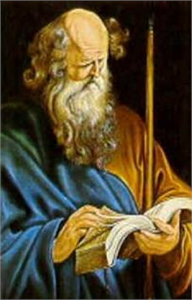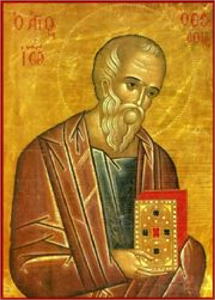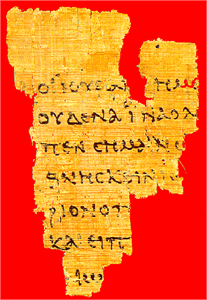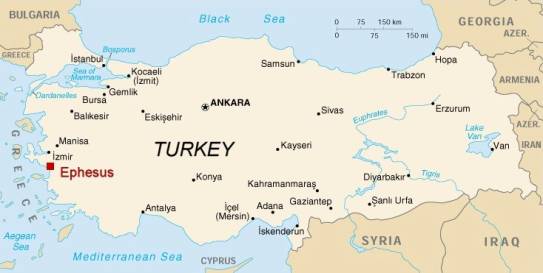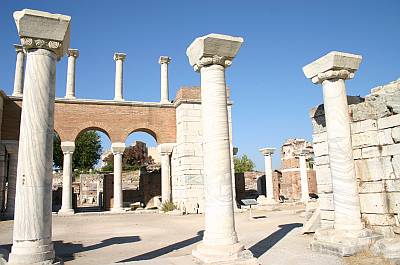
Christmas
Easter
Pentcoest
All Saints
Christ The King
Confirmation
Palm/Passion
Reformation
Stewardship
Books of the Bible
Lenten Series
Christmas Dramas
Videos
Series A - Matthew
Series B - Mark
Series C - Luke
Series D - Other
To contact
Edward F. Markquart
info@sfs.com
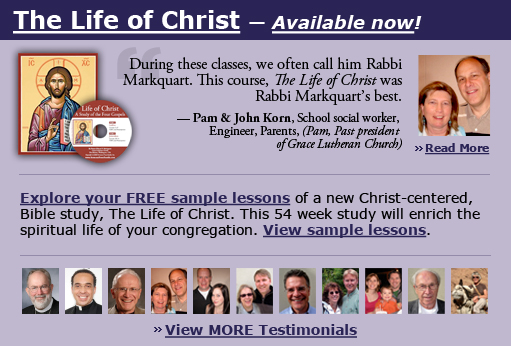
Series B Series of Sermons: I John Easter 2B I John 1:1-2:1 Today, this Sunday after Easter, we begin a series of sermons on the book of I John. For those of us who have been studying the Bible for some years, we know that the book of I John give us the best lyrics of love in the whole Bible, that there is more about love in this short letter than any other book in the Bible. In I John, this letter of love, we hear that profound but simple phrase, “God is love.” No one had ever spoken those words before in the history of humankind. In I John, this letter of love, we hear words such as “There is no fear in love but love casts out fear.” No one had ever spoken these words before. In I John, this letter of love, we hear the words, “We love because he first love us.” No one had ever spoken these words before John. We can learn about love not only from I John but also from the web. If you type in the word, “love,” in your Google search engine, you will find two billion links to the word, “love.” Yes, two billion. For example, on the web, you can read about the “love calculator” and how you can calculate if that person is right for you for romance and relationship. On the web, you can read thousands of love poems and love quotations. On the web, you can find out the truth about love in our modern world. Our society is fascinated with the word, “love.” But ... in this sermon, we are going to the earliest and most reliable source that teaches what love is and what love means to our daily lives. We are going to the Bible, and in particular, to the Epistle of I John. Before the Epistle of I John was written, no one had thought about love and written about love in such depth and with such profundity. During the next five weeks here at church, we are going to walk through some of the best chapters and verses in this short letter called First John. Today, we begin with I John, chapter 1 which tells us that the Apostle John was a first hand eyewitness of Jesus of Nazareth, that the Apostle John actually knew Jesus, that John walked and talked personally with Jesus. John knew and saw and heard Jesus first hand. John is the only one of the disciples to write a gospel about Jesus. He is the only one of the disciples to write a letter of love. What do we know about John, the beloved disciple? We always want to know the credentials of the person who is talking like an authority on the subject.. If the credentials are excellent, we listen carefully. The credentials of John the Apostle are superb. More than any other human being, John understood Jesus' teachings about love. His credentials? The Apostle John was one of Jesus’ first disciples. He walked and talked with Jesus for three years. He was the only disciple at his crucifixion. He loved Jesus so much he was at the cross with Jesus that Good Friday when all the other disciples ran away. From the cross, Jesus entrusted the care of his mother to John. Jesus must have known something about the quality of John's heart for Jesus to entrust his mother to John's care. Then three days later on Easter, John was the first disciple to believe in the resurrection. Many years later, at the end of his life, John sat down and wrote the Gospel of John and his letter of love, First John. Yes, John had the best of credentials of any disciple to write about Jesus and Jesus' understanding of love. Further, we hear that Jesus loved John more than the other disciples. John was called the “beloved disciple” or the “disciple whom Jesus loved.” For example, at the last supper, it was John who was reclining next to Jesus, “One of his disciples—the one whom Jesus loved—was reclining next to him”and Jesus was having a private conversation with him. We are not told of Jesus having a private conversation with any other disciple. (John 13:23) As Jesus hung on the cross on Good Friday, he looked down from the cross to his trusted friend who was standing beside his mother in that sacred painful moment and he entrusted his mother to John’s care “When Jesus saw his mother and the disciple whom he loved standing beside her, he said to his mother, "Woman, here is your son." Then he said to the disciple, "Here is your mother." And from that hour the disciple took her into his own home.” Jesus trusted the care of his mother to his closest friend John. Jesus must have known that John was the most loving of all his disciples to entrust the care of his mother to him. (John 19:23-24.) At Jesus resurrection appearance on the Sea of Galilee, we hear the words, “That disciple whom Jesus loved said to Peter, "It is the Lord!" When Simon Peter heard that it was the Lord, he put on some clothes, for he was naked, and jumped into the sea.” (John 21:7) Again, John was the disciple whom Jesus loved. The Bible tells us that John loved Jesus more than any other disciple. In their relationship, John understood Jesus' teachings about more than any of them. With the computer, we can trace the use of the word, “love,” in the New Testament. We will find that the word, “love,” is used thirty-five times within five chapters in this little letter of love, I John. By comparison, we find the word “love” fifteen times in twenty-eight chapters in the Gospel of Mathew; six times in sixteen chapters in the Gospel of Mark; fifteen times in twenty-four chapters in the Gospel of Luke; twenty-seven times in twenty-one chapters of the Gospel of John. And a whopping thirty-five times in five chapters in the short little letter of I John. The word “love” occurs seven times per chapter in that little love letter. Yes, this man, this apostle, this most trusted friend of Jesus has the best credentials in the whole Bible to talk about love. More than any other human being, John understood Jesus' teachings about love. We also remember that John and his brother, James, were fishermen on the Sea of Galilee when Jesus first called them, that they were sons of Zebedee and Salome and that they were known as the “sons of thunder.” “Sons of thunder” meant that the two brothers had hot tempers. We recall the story of their “hot tempers” in Samaria when these two hot headed brothers wanted Jesus to call for fire and brimstone and burn up the Samaritans who rejected Jesus. They were hot headed and hot tempered. Gradually, Jesus' love must have gotten into the heart of John and his hot headed personality was changed. John, the hot tempered, hot headed disciple became became the apostle of love who wrote more about love than any author in the entire Bible.. Where did the concept of “love” originate? Within the history of the human race, where did the idea of love come from?Some scholars trace the origins of the concept of love to Aristophanes at the time of Socrates three hundred years before the Apostle John. Aristophanes and his colleagues were philosophizing about love. The Greek word for love, “agape,” was in the air when the Apostle John wrote his letter of love. The concept of love was in the cultural air of Hellenism before John wrote his letter. But we can’t find a “love letter” that philosophizes about love before John’s love letter. The earliest (or close to the earliest) letter in the history of the human race that focuses so totally on love is the letter of I John. Let’s do a Bible study of the text for today. From I John. We turn to your bulletin insert and the reading of the lesson for today. We know the author well. The Apostle John. He has great credentials. 1 We declare to you what was from the beginning, Circle the word, “we,” and you and I realize that a group of people is writing this letter. It is not solely the Apostle John but some of his followers who are with him. Circle the word “beginning.” "Beginning" does not refer to "the beginning of time" as in the Book of Genesis but the beginning of Jesus’ ministry. what we have heard, The Apostle John and his friends are telling us that they are first hand witnesses, that they have heard Jesus with their own ears, seen Jesus with their own eyes and touched Jesus with their own hands. These are first hand witnesses to the life of Jesus of Nazareth. No other gospel writer claims to be a first hand witness as does the Apostle John. what we have seen with our eyes, The Apostle John and his friends have seen Jesus with their own eyes. what we have looked at and touched with our hands, The Apostle John and his friends have touched Jesus with their own hands. We recall the scene after the resurrection where doubting Thomas was asked by Jesus to touch his wounds and see if they were real. concerning the word of life— Circle the word, “word.” We recall from John 1:14 that the “Word became flesh, a human being, and lived among us.” The word, “life,” is also a favorite word of John. The word, “life” is found 45 times in his gospel. He repeats that word all the time. We recall Bible verses from John which says, “I have to bring you life and bring it more abundantly.” “The Son gives life.” “The Father gives life.” “The Spirit gives life.” 2 this life was revealed, Circle the word, “revealed,” and write in the word, “unveiled.” You take a veil of the face of a person and you see that person. and we have seen it “It” refers to this life of Christ. We have seen the life of Christ. and testify to it, “It” refers to this life of Christ. The Apostle John and friends want to testify, to make known, give evidence, bear witness to the life of Christ. and declare to you the eternal life Jesus gives not only life but eternal life. Sixteen times in the Gospel of John we hear about the eternal life that Jesus gives. “You have the words of eternal life.” “I gave them eternal life.” “Whoever believes in him has eternal life.” that was with the Father This eternal life was with the Father. and was revealed to us— This eternal life is revealed to us, unveiled to us, uncovered for us. 3 we declare to you what we have seen and heard Again, the Apostle John and his disciples are declaring that they have seen and heard Jesus first hand. They are not second or third hand witnesses. so that you also may have fellowship with us; Circle the word, “you,” and write in your own name by it. So that ______ may have fellowship with John and his friends. Circle the word, “fellowship” which means community, group togetherness, familyness. As we read John’s letter, we are in fellowship with the Apostle John and his friends. and truly our fellowship is with the Father and with his Son Jesus Christ. Not only fellowship and group togetherness with the Apostle and his friends but fellowship with the Father and fellowship with his Son Jesus. (We have fellowship with the Father, Son and Spirit.) 4 We are writing these things so that our joy may be complete. Circle the word, “writing,” and know that this is the first time when we are told that the Apostle John and his friends are writing these thoughts and memories. They were writing on papyrus, a reed from Egypt from which we get out word, “paper.” Get into your mind a painting or visual image of John writing these things down. We know much about John the Apostle from early church historians. Most scholars think that John was a very old man and at the end of his life when he and/or his friends composed the gospel and the epistle, that he wrote the words for his gospel and his letter of love in about the year 90 CE, that he was a church leader in Asia Minor at the time (Church Father, Justin Martyr), that he was writing from the city of Ephesus (Church Father, Irenaeus), the new center of Christianity for a few decades in the Early Church, that he was a pastor at Ephesus, that he died peacefully in his old age at Ephesus. St. Jerome, another Church Father, tells us that John constantly repeated one refrain in his old age: "Little children, love one another." The following are two paintings of the elderly Apostle John with books. He wrote both the Gospel of John and Epistle of John. These two paintings are from the imaginations of two skilled artists.
http://clipart.crossmap.com/data/medium/1219485908.jpg
These paintings show the elderly Apostle John with a book. Books with pages of paper in them had not been invented yet. The Apostle John wrote on pieces of papyrus or on a scroll, but not in a book. We see John as an old man at the end of his life, in about the year 90 CE. Both paintings demonstrate the wrinkled face and white hair of an old man. http://www.orthodoxwiki.org/images/1/11/John_the_Theologian.jpg
Next is a picture of the oldest fragment in existence of the New Testament. It is called Papyrus 52. It was written in about 125 CE. This snippet of papyrus contains verses from the Gospel of John, 18:31-33,36-38. It measures 3 ½ inches by 2 1/2 inches, and is truly a fragment. The words in this snippet of papyrus are identical to our Gospel of John from today. That’s impressive. http://rylibweb.man.ac.uk/data1/dg/text/fragment.htm
Next, we see a map of Turkey. We see the port city of Ephesus on the Mediterranean Sea. Ephesus was the capitol city of Christianity after the fall of Jerusalem. It is in this city that the old Apostle John wrote the Gospel of John and I John. http://www.nelsonideas.com/history-of-christmas/Ephesus-map.jpg
Next is a picture of the Basilica of St. John that was built to commemorate his life. It is near Ephesus. This basilica was built in the fourth century, over the gravesite of the Apostle John, so tradition tells us.
http://www.ephesus.us/images/stjohn.jpg
These images emphasize that the Apostle John was a real live human being who was a loving leader in the early church in Ephesus where he wrote the Gospel of John and the love letter of I John. So we remember that the Apostle John and his friends wrote these things down for us, so that our joy would be complete. As we walk in the ways of love and walk in the light of Jesus, we find joy in life. 5 This is the message we have heard from him and proclaim to you, The Apostle John and his friends heard a message from the lips and tongue of Jesus and they want to now proclaim it to us twenty centuries later. Circle the word, “him,” and write in the word, "Jesus." Circle the word, “you,” and write in your own name. This is the message we have heard from Jesus and we now proclaim to you, ______. Edward or whatever your name may be. This is not our message but the message comes from Jesus himself. This is Jesus’ message. that God is light and in him there is no darkness at all. This is the message thatthe Apostle John heard from Jesus: that God is light and there is no darkness at all in him. What does it mean that God is light? What does it mean that God is the opposite of darkness? Don’t make your answers complicated. What does it mean for you that God is light? Every single human being loves light. Light gives life. Light gives happiness. Light enables us to see clearly. Light is power. Light is the source of all life. A plant can't grow without life and you and I cannot grow in love without the light of Jesus shining in us and helping that love to grow. 6 If we say that we have fellowship with him while we are walking in darkness, we lie and do not do what is true; Circle the word, “darkness,” and write in the word, sin. If we say that we have fellowship with Jesus while we are walking in the ways of sin, we are liars. 7 but if we walk in the light as he himself is in the light, We are to walk in the light, as Christ himself is in the light. Underline, circle, highlight. This is the central theme of this first chapter and the central theme of this sermon: Jesus is inviting us to walk in the light. God is light;Jesus is light; and we are to walk in the light. What does it mean for you to walk in the light of the Lord? Each of us is living in a different situation. In your personal situation at this moment in your life, what does it mean for you to walk in the light of the Lord? That is what this Biblical text is all about. At the conclusion of the sermon for today, I will ask you to briefly talk with a person seated near you about what you feel it means to "walk in the light of the Lord" in your situation in life. we have fellowship with one another, and the blood of Jesus his Son cleanses us from all sin. When we walk in the light, we have fellowship with one another. When we walk in the light of Christ, we are aware that Jesus cleanses us from all sin. From ALL our sin. 8 If we say that we have no sin, we deceive ourselves, and the truth is not in us. We need to be honest and not deceive ourselves. We are all sinful people and cannot escape our sinful nature nor our specific, everyday sins. Let’s none of us be phonies and pretend that we do not sin or that our sinning is relatively harmless. 9 If we confess our sins, he who is faithful and just will forgive us our sins and cleanse us from all unrighteousness. We are to confess our sins and God and Jesus will forgive us our sins and cleanse us from all unrighteousness. These words are part of the absolution we hear during our Sunday morning liturgy. 10 If we say that we have not sinned, we make him a liar, and his word is not in us. 1 My little children, Here we see that perhaps the Apostle John is an older man and is writing to you and me. This is the first of eight times in this short epistle that we are called, "little children." This phrase will be the focus on our next sermon on I John. I am writing these things to you so that you may not sin. But if anyone does sin, we have an advocate with the Father, Jesus Christ the righteous; If and when we sin, we have an advocate with the Father and who is our advocate? Jesus Christ. In God's heavenly court, when the devil accuses us of sinning, we have an advocate in Jesus Christ who comes to stand beside us and defend us. So having completed this Bible study of the first chapter, take a moment and look back at the words and phrases that we have studied. Which of these words resonate most clearly in your heart and mind? Let’s pause for a moment as you reread this chapter. Select a word or phrase from this chapter which is meaning to you. Why it is meaningful to you? Also, what does it mean for you to walk in the light of the Lord in your situation in life today? I would now like you to share the word, phrase, or Bible verse which is most meaningful to you with someone seated next to you, behind you, in front of you. Not your spouse please. Not your family member please. Let us have the whole congregation buzzing with sharing which portion of this Scripture is most important to you and why? Or what does it mean for you in your situation to walk in the light of the Lord? (Pause for one minute while the discussions go on.) Amen. |
